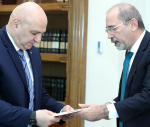You are here
Gender roles in media coverage focus of Generations for Peace panel discussion
By Batool Ghaith - Jun 04,2022 - Last updated at Jun 04,2022
AMMAN — Generations for Peace, a global non-profit peacebuilding organisation, on Saturday held a panel discussion on gender issues and ethics in media coverage.
The panel comes as part of the second edition of the Media for Peace Programme, implemented in partnership with the US Embassy in Amman.
The discussion was moderated by journalist Amneh Al Tubaishi who indicated that gender issues are “fundamental issues in our society”.
“Our role as media should be used to shed light, raise awareness and educate about the issues that affect us directly,” Tubaishi said.
Gender Specialist Bisan Jaber said that "gender defines every person as who they are, psychologically and physically".
Jaber said that societal gender roles and relations influence media content, media practices, and the way media is used, and vice versa as well, “as media also affects and influences our practices and social life”.
Head of the Communication and Advocacy Unit at the National Committee for Women's Affairs Ashjan Al Ananazah said that the National Strategy for Women in Jordan is prepared by the Jordanian National Committee for Women’s Affairs in cooperation with its partners and it is the national mechanism concerned with the advancement of women in Jordan.
Ananzah noted that the strategy has taken all the priorities and issues related to women in Jordan into consideration and has built them “into a participatory approach”, included in all governorates.
The most pressing issues included in the strategy for the next five years are women’s access to decision-making positions, women’s economic participation, gender-based violence and all the contents of these issues, which the media comes as “an axis present within them”, Ananzah said.
She also said that while “we have come long ways in the field of women’s rights”, there are many laws and legislation that still need to be reviewed to advance women’s rights, such as such as the Penalties Law, the Labour Law and others.
Nadine Al Nimri, a journalist who covers gender and human rights, noted that media coverage of gender-related issues is “low and seasonal”.
“We do not deny that in recent years there has been an improvement in media coverage on gender issues, which has helped to solve and draw attention to many issues and make them a priority,” Nimri said.
However, Nimri noted that media coverage on gender-related topics still has “plenty of issues and challenges”, such as not discussing gender-issues in sufficient depth and “attacking women who make any mistake”, as well as the use of the term “honour killing”.
Professor of Psychology Firas Al Habis said that while masculinity and femininity are biological, social gender roles are what society has classified and indentified.
Media affects people in three ways — thoughts, feelings, and behaviours — which is why it is important to have an “effective, sufficient and fair media coverage of gender-related issues”, Habis added.
Related Articles
AMMAN — Starting Thursday, researchers can access the Takamol HAQQI Gender Clearing House platform for information on legislation, research
AMMAN — In step with the Kingdom’s three-dimensional path to modernisation, the National Conference on Women’s Paths in the Modernisation Vi
More than half of all female homicide victims worldwide — 137 every day — were killed by a member of their own family last year, according t
















